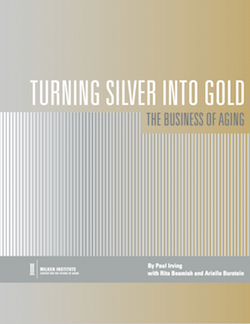
The senior living industry, with innovation and imagination, could drive a new era of healthful aging and help steer a cultural shift related to aging, one of the authors of a new report from the Milken Institute told McKnight’s Senior Living. “But things must change,” she added.
The nonprofit, nonpartisan think tank, released “Turning Silver into Gold: The Business of Aging,” on Thursday. The 104-page report includes data and insights from multiple sources and identifies opportunities, strategies, policies and practices to help businesses address ageism, better serve older adults and capitalize on their abilities and desires to contribute.
The senior living industry, said Arielle Burstein, associate director of the Center for the Future of Aging at the Milken Institute and one of the authors of the report, “is an industry sector that knows its customer — a customer other industry sectors are beginning to covet. The senior living industry can’t fail to capitalize on its expertise, understanding and leading position — for its own good and the good of its clients. The possibilities are there for a very bright future. Will the industry respond?”
The report notes some of the ways that businesses such as senior living communities are meeting or could meet the needs of older adults — by partnering with Uber and Lyft to offer transportation, for instance, or by testing autonomous vehicles.
Latitude Margaritaville planned active adult communities, inspired by musician Jimmy Buffett and brought to life by Minto Communities and Margaritaville Holdings, are cited for their marketing efforts.
“Older adults do not want to be patronized, but they do want their needs acknowledged, and companies must find ways to do this while emphasizing the positive and reality-based aspects of aging,” the authors write, noting that the Latitude Margaritaville website “avoids explicit references to age while inviting people to a ‘home in paradise’ with photos of vital, mature adults socializing while engaged in sports and dining.”
The report authors see a future in which aging services providers increasingly will turn to technology — robotic caregiving assistants and digital health tools, for instance — to help people remain as independent as possible as they grow older.
“The senior living sector can respond — and lead,” Burstein told McKnight’s Senior Living. “Opportunities include expanding and branding products and services and spreading access and know-how to physical and virtual communities that are outside the ‘campus.’ Lifelong learning and possibilities for purposeful work, volunteering and relationship development can be emphasized on senior living campuses. Interaction and the benefits of community can be enhanced. Recruiting, training and forward-looking HR practices can elevate staff performance and the client experience.”
The center plans to launch a new business council this year that will include senior executives of national and multinational companies who will be tasked with addressing opportunities presented by the aging population. Meanwhile, the Milken Institute Center for the Future of Aging plans to share “Turning Silver Into Gold” with business leaders, policymakers, academicians, philanthropists, nonprofit leaders and others.



